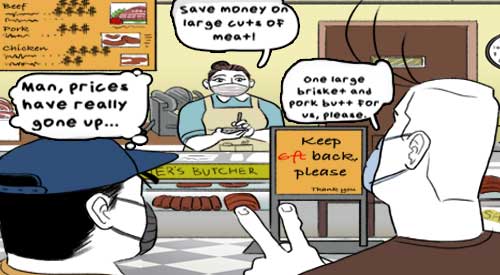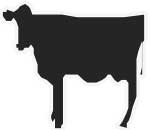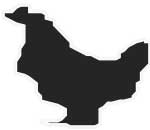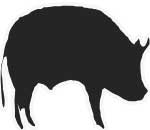 |
| Chef Burt and Tom visit the butcher for weekend supply of large cuts of meat that grill & smoke well! |
For many who have been spending additional time with family, new levels of communication and closeness have resulted, that simply put, want to be continued. Given that nicer weather also contributes to family time scheduling, I thought I would cover how you can maximize time to spend with family rather than be cooking inside. Or, worse yet, forfeiting money on takeout food purchases.
Time to cover the cuts of meats that are not only ideal for grilling and smoking but will produce enough meat to provide for more than one meal. I will also make my recommendations on hardwoods to use for optimal flavor balance.
Cuts of Meat that Grill & Smoke Well:
 Beef
Beef
Chuck Roast: Cut from the beef shoulder just above the short rib, chuck roast becomes increasingly tender when roasted on the grill using a two-zone cooking method. You may know chuck roast as the cut of meat used when you want to do a one-pot-meal. This concept can easily be done on the grill or smoker as well, by placing the meat and favorite vegetables in the same cooking pan or on a sheet pan. By placing the food pan on the unlit side of the grill, you can treat this just like using an oven.
Rib-Eye Roast: Also known as prime rib roast, rib roast, and standing rib roast, this is one of the more tender cuts of beef and on the higher price end. This roast cut is situated under the front end of the backbone. Often the best means of cooking this meat is with seasoning and a bit of herb. Be sure to visit our previous article on wood-fired cooking prime rib for specific tips
Eye of Round Roast: This cut of beef is the typical one that grocery delis produce their roast beef from. This is an inexpensive cut from the rump and hind legs of the cow and is perfect for a slow grilling/smoking method.
Bottom Round Roast: Also known as Rump Roast, this too is an inexpensive cut that is ideal for slower cooking on the grill or smoker.
Brisket: Derived from the lower front of the cow, near the front legs, brisket is from a muscle that bears 60 percent of the animal’s weight making it ideal for low temperature cooking.
Beef Ribs: Do not confuse these ribs with the meaty quality of pork ribs, as there tends to not be quite as much. However, they are still delicious and worth grilling. I prefer to have the butcher cut the length of ribs I want when it comes to the short rib variety, as you don’t have to purchase small cuts.
Flank Steak: One of my favorites for marinating and then grilling two-zone method.
Hardwood Recommendations for Beef: A combination of hardwoods is best so selecting 2 or 3 from these tried and true hardwoods: Beech, Hickory, Red oak, Sugar Maple, White Oak, Cherry.

Pork
Pork Loin Roast: Containing just a small amount of fat, the loin roast comes from the area between the shoulder and the start of the leg and usually are sold between 2-5 pounds. This is a perfect cut for the grill, though you may be told to cook it direct fire method, I still prefer to set up a two-zone cooking method.
Pork Shoulder/Butt: From the front of the pig behind the neck, shoulder/butt cuts are full of fat that work very well for long, lower temperature cooking. Generally, this cut is cooked on the grill or smoker using a temperature of about 225°F and takes 8-10 hours depending on the size, which range from 6-14 pounds.
Baby Back Ribs: A very tender rib cut that comes from the pork loin off the back of the pig. This is the most popular pork rib cut for the grill.
Spare Ribs: These ribs are cut from the belly of the pig. Most popular cut is St. Louis style.
Country Style Ribs: These ribs are derived from the end of the loin closest to the rump. The meat can dry out quick so marinating is highly recommended.
Picnic Ham: As the lower portion of the shoulder, it can be tough and fatty if not subjected to a slow, lower temperature cooking method. Do this right, with a simple rub then glazing the last hour or so, and you will have a result that is tender and juicy for many meals.
Hardwood Recommendations for Pork: Pork allows for greater variation in hardwood flavors. Using alone or combination, perfect woods include: Ash, Beech, Hickory, Sugar Maple, White Oak, and Cherry.

Chef Burt and Tom arrive home from the butcher just in time to meet Fed Ex delivering there wood from Smokinlicious® Culinary wood products.
Chicken and Turkey

Breast: This portion of the chicken or turkey can easily become dry if cooked over direct fire. That is why I recommend you always cook on the cold side of the grill. If you prefer a char flavoring, you can move the pieces to the direct fire side for just a few minutes to finish them off, especially if you are glazing or saucing.
Leg Quarters and Drumsticks: As with the breast meat, although these pieces will stay tender and juicier over a direct fire, I still prefer to cook in the cold side of the grill. This ensures even cooking as the darker meat of poultry does take longer to cook then white.
Whole Chicken and Turkey: Although you certainly can cook these on a rotisserie, I prefer to spatchcock them which includes removal of the backbone and flatten the meat for more even cooking. You can find our method for spatchcocking chicken here:
Hardwood Recommendations for Poultry: I particularly lean toward using two or three hardwood combinations for poultry in order to balance the lighter meat flavor with wood. Here are some great combinations to consider: #1 ash, maple, cherry #2 hickory, maple, cherry #3 maple & cherry #4 white oak & cherry. Experiment and find your perfect balance.
As you see, two-zone cooking is the best method to ensure you don’t have to be tied to the grill for hours at a time and instead, can continue to do more with family. Larger cuts of meat will not only save you money but extend your animal protein supply for multi meals. Oh, and don’t forget, live fire cooked meats freeze well and the smoked component preserve them for even longer use dates.
What cut of meat is your favorite for the grill or smoker? Leave us a comment and subscribe to get our latest tips, techniques, recipes and the science behind the fire and smoke, for all live fire cooking methods. That’s SmokinLicious!

No comments:
Post a Comment